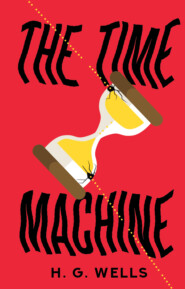По всем вопросам обращайтесь на: info@litportal.ru
(©) 2003-2025.
✖
The Food of the Gods and How It Came to Earth
Настройки чтения
Размер шрифта
Высота строк
Поля
"You must make a road for it first, Sonnie," Cossar had said, "before you can do that."
So one morning about dawn the young giant and his brothers had set to work to make a road about the world. They seem to have had an inkling of opposition impending, and they had worked with remarkable vigour. The world had discovered them soon enough, driving that road as straight as a flight of a bullet towards the English Channel, already some miles of it levelled and made and stamped hard. They had been stopped before midday by a vast crowd of excited people, owners of land, land agents, local authorities, lawyers, policemen, soldiers even.
"We're making a road," the biggest boy had explained.
"Make a road by all means," said the leading lawyer on the ground, "but please respect the rights of other people. You have already infringed the private rights of twenty-seven private proprietors; let alone the special privileges and property of an urban district board, nine parish councils, a county council, two gasworks, and a railway company…"
"Goodney!" said the elder boy Cossar.
"You will have to stop it."
"But don't you want a nice straight road in the place of all these rotten rutty little lanes?"
"I won't say it wouldn't be advantageous, but – "
"It isn't to be done," said the eldest Cossar boy, picking up his tools.
"Not in this way," said the lawyer, "certainly."
"How is it to be done?"
The leading lawyer's answer had been complicated and vague.
Cossar had come down to see the mischief his children had done, and reproved them severely and laughed enormously and seemed to be extremely happy over the affair. "You boys must wait a bit," he shouted up to them, "before you can do things like that."
"The lawyer told us we must begin by preparing a scheme, and getting special powers and all sorts of rot. Said it would take us years."
"We'll have a scheme before long, little boy," cried Cossar, hands to his mouth as he shouted, "never fear. For a bit you'd better play about and make models of the things you want to do."
They did as he told them like obedient sons.
But for all that the Cossar lads brooded a little.
"It's all very well," said the second to the first, "but I don't always want just to play about and plan, I want to do something real, you know. We didn't come into this world so strong as we are, just to play about in this messy little bit of ground, you know, and take little walks and keep out of the towns" – for by that time they were forbidden all boroughs and urban districts, "Doing nothing's just wicked. Can't we find out something the little people want done and do it for them – just for the fun of doing it?
"Lots of them haven't houses fit to live in," said the second boy, "Let's go and build 'em a house close up to London, that will hold heaps and heaps of them and be ever so comfortable and nice, and let's make 'em a nice little road to where they all go and do business – nice straight little road, and make it all as nice as nice. We'll make it all so clean and pretty that they won't any of them be able to live grubby and beastly like most of them do now. Water enough for them to wash with, we'll have – you know they're so dirty now that nine out of ten of their houses haven't even baths in them, the filthy little skunks! You know, the ones that have baths spit insults at the ones that haven't, instead of helping them to get them – and call 'em the Great Unwashed —-You know. We'll alter all that. And we'll make electricity light and cook and clean up for them, and all. Fancy! They make their women – women who are going to be mothers – crawl about and scrub floors!
"We could make it all beautifully. We could bank up a valley in that range of hills over there and make a nice reservoir, and we could make a big place here to generate our electricity and have it all simply lovely. Couldn't we, brother? And then perhaps they'd let us do some other things."
"Yes," said the elder brother, "we could do it very nice for them."
"Then let's," said the second brother.
"I don't mind," said the elder brother, and looked about for a handy tool.
And that led to another dreadful bother.
Agitated multitudes were at them in no time, telling them for a thousand reasons to stop, telling them to stop for no reason at all – babbling, confused, and varied multitudes. The place they were building was too high – it couldn't possibly be safe. It was ugly; it interfered with the letting of proper-sized houses in the neighbourhood; it ruined the tone of the neighbourhood; it was unneighbourly; it was contrary to the Local Building Regulations; it infringed the right of the local authority to muddle about with a minute expensive electric supply of its own; it interfered with the concerns of the local water company.
Local Government Board clerks roused themselves to judicial obstruction. The little lawyer turned up again to represent about a dozen threatened interests; local landowners appeared in opposition; people with mysterious claims claimed to be bought off at exorbitant rates; the Trades Unions of all the building trades lifted up collective voices; and a ring of dealers in all sorts of building material became a bar. Extraordinary associations of people with prophetic visions of aesthetic horrors rallied to protect the scenery of the place where they would build the great house, of the valley where they would bank up the water. These last people were absolutely the worst asses of the lot, the Cossar boys considered. That beautiful house of the Cossar boys was just like a walking-stick thrust into a wasps' nest, in no time.
"I never did!" said the elder boy.
"We can't go on," said the second brother.
"Rotten little beasts they are," said the third of the brothers; "we can't do anything!"
"Even when it's for their own comfort. Such a nice place we'd have made for them too."
"They seem to spend their silly little lives getting in each other's way," said the eldest boy, "Rights and laws and regulations and rascalities; it's like a game of spellicans… Well, anyhow, they'll have to live in their grubby, dirty, silly little houses for a bit longer. It's very evident we can't go on with this."
And the Cossar children left that great house unfinished, a mere hole of foundations and the beginning of a wall, and sulked back to their big enclosure. After a time the hole was filled with water and with stagnation and weeds, and vermin, and the Food, either dropped there by the sons of Cossar or blowing thither as dust, set growth going in its usual fashion. Water voles came out over the country and did infinite havoc, and one day a farmer caught his pigs drinking there, and instantly and with great presence of mind – for he knew: of the great hog of Oakham – slew them all. And from that deep pool it was the mosquitoes came, quite terrible mosquitoes, whose only virtue was that the sons of Cossar, after being bitten for a little, could stand the thing no longer, but chose a moonlight night when law and order were abed and drained the water clean away into the river by Brook.
But they left the big weeds and the big water voles and all sorts of big undesirable things still living and breeding on the site they had chosen – the site on which the fair great house of the little people might have towered to heaven …
IV
That had been in the boyhood of the Sons, but now they were nearly men, And the chains had been tightening upon them and tightening with every year of growth. Each year they grew, and the Food spread and great things multiplied, each year the stress and tension rose. The Food had been at first for the great mass of mankind a distant marvel, and now It was coming home to every threshold, and threatening, pressing against and distorting the whole order of life. It blocked this, it overturned that; it changed natural products, and by changing natural products it stopped employments and threw men out of work by the hundred thousands; it swept over boundaries and turned the world of trade into a world of cataclysms: no wonder mankind hated it.
And since it is easier to hate animate than inanimate things, animals more than plants, and one's fellow-men more completely than any animals, the fear and trouble engendered by giant nettles and six-foot grass blades, awful insects and tiger-like vermin, grew all into one great power of detestation that aimed itself with a simple directness at that scattered band of great human beings, the Children of the Food. That hatred had become the central force in political affairs. The old party lines had been traversed and effaced altogether under the insistence of these newer issues, and the conflict lay now with the party of the temporisers, who were for putting little political men to control and regulate the Food, and the party of reaction for whom Caterharn spoke, speaking always with a more sinister ambiguity, crystallising his intention first in one threatening phrase and then another, now that men must "prune the bramble growths," now that they must find a "cure for elephantiasis," and at last upon the eve of the election that they must "Grasp the nettle."
One day the three sons of Cossar, who were now no longer boys but men, sat among the masses of their futile work and talked together after their fashion of all these things. They had been working all day at one of a series of great and complicated trenches their father had bid them make, and now it was sunset, and they sat in the little garden space before the great house and looked at the world and rested, until the little servants within should say their food was ready.
You must figure these mighty forms, forty feet high the least of them was, reclining on a patch of turf that would have seemed a stubble of reeds to a common man. One sat up and chipped earth from his huge boots with an iron girder he grasped in his hand; the second rested on his elbow; the third whittled a pine tree into shape and made a smell of resin in the air. They were clothed not in cloth but in under-garments of woven rope and outer clothes of felted aluminium wire; they were shod with timber and iron, and the links and buttons and belts of their clothing were all of plated steel. The great single-storeyed house they lived in, Egyptian in its massiveness, half built of monstrous blocks of chalk and half excavated from the living rock of the hill, had a front a full hundred feet in height, and beyond, the chimneys and wheels, the cranes and covers of their work sheds rose marvellously against the sky. Through a circular window in the house there was visible a spout from which some white-hot metal dripped and dripped in measured drops into a receptacle out of sight. The place was enclosed and rudely fortified by monstrous banks of earth, backed with steel both over the crests of the Downs above and across the dip of the valley. It needed something of common size to mark the nature of the scale. The train that came rattling from Sevenoaks athwart their vision, and presently plunged into the tunnel out of their sight, looked by contrast with them like some small-sized automatic toy.
"They have made all the woods this side of Ightham out of bounds," said one, "and moved the board that was out by Knockholt two miles and more this way."
"It is the least they could do," said the youngest, after a pause. "They are trying to take the wind out of Caterham's sails."
"It's not enough for that, and – it is almost too much for us," said the third.
"They are cutting us off from Brother Redwood. Last time I went to him the red notices had crept a mile in, either way. The road to him along the Downs is no more than a narrow lane."
The speaker thought. "What has come to our brother Redwood?"
"Why?" said the eldest brother.
The speaker hacked a bough from his pine. "He was like – as though he wasn't awake. He didn't seem to listen to what I had to say. And he said something of – love."
The youngest tapped his girder on the edge of his iron sole and laughed.
"Brother Redwood," he said, "has dreams."
Neither spoke for a space. Then the eldest brother said, "This cooping up and cooping up grows more than I can bear. At last, I believe, they will draw a line round our boots and tell us to live on that."
The middle brother swept aside a heap of pine boughs with one hand and shifted his attitude. "What they do now is nothing to what they will do when Caterham has power."
"If he gets power," said the youngest brother, smiting the ground with his girder.

















